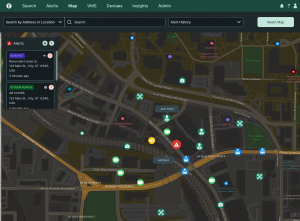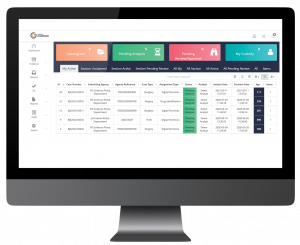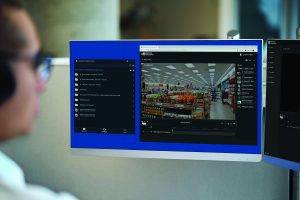
Today’s technological advancements can be a blessing to the policing profession. From lab analysis to personnel management to crime scene investigation, the ever-evolving tools and resources available have impacted every aspect of law enforcement, often resulting in increased efficiency and effectiveness. But the advancements can also present several unforeseen challenges, many of which are relevant when handling digital evidence.
Only a decade ago, agencies struggled to find quality information to respond to a call for service; however, that challenge was reduced as various audio and visual solutions, like security cameras and smartphones, became norms in society. “It will become increasingly more challenging to manage the sheer amount of digital evidence being created nowadays, especially considering the staffing and time constraints that policing agencies today experience,” said Dalton Webb, Flock Safety’s director of RTCC Strategy.1
There have never been more sources of information available to law enforcement professionals, but how do agencies keep it manageable in order to effectively leverage it?
Cloud-Based Management
As highly effective digital evidence–collecting tools come on the market, the buildup of evidence grows larger. Flock Safety (Flock), for instance, builds evidence-capturing hardware such as license plate recognition cameras, gunshot detection systems, and livestreaming camera systems that help provide objective evidence to investigators. Although this often means more cases can be cleared sooner, the plethora of information creates another problem—investigators and analysts spend countless hours organizing the evidence.

In the midst of a recruiting crisis, the last thing agencies need is to spread their resources too thin by keeping personnel occupied with administrative functions rather than responding to calls for service. Many police product companies acknowledge this challenge and have made it a priority to build tools to streamline the digital evidence management process.
When agencies utilizing their evidence-collecting hardware asked for a single platform that could handle the bulk of the digital evidence alerting and search capabilities, Flock developed a high-quality digital mapping platform so analysts and officers could see where their devices are located. Flock’s software platform, FlockOS, provides the foundation for all hardware and software products.
By integrating an agency’s existing devices, the platform is ideal for placing all types of media into one dashboard, so dispatchers, crime analysts, and other investigative staff can solve crime more efficiently. FlockOS also integrates directly with Evidence.com, which helps break down silos between evidence collected on Flock’s devices and that collected by Axon technology.
Evolving from strictly a license plate recognition company into an all-encompassing crime solution company, Flock measures its success on how much crime it is helping to solve. “By our current estimates, Flock’s technology is having a direct impact on helping law enforcement solve about seven percent of reported crime in the [United States],” said Webb.2

Digital evidence is pivotal in nearly every criminal case. Smartphones can hold crucial data for solving crimes, but the sheer volume can overwhelm examination resources. “[Cellebrite’s] Guardian tackles these challenges by optimizing lab operations, ensuring resource limitations don’t hinder data sharing and review and eliminating the need for multiple unmanaged copies on portable drives,” said Ronnen Armon, chief products and technologies officer at Cellebrite.3 Guardian leverages cloud technology to link investigators, examiners, prosecutors, and experts across different locations and networks. The solution enables investigators to submit evidence, track progress, maintain chain of custody, support detailed data collection, and provide real-time access to digital evidence.
Released in 2021, Guardian was created to streamline the digital evidence management process, eliminating manual obstacles that hinder investigations and ensuring maximum efficiency and compliance. Guardian seamlessly integrates into existing workflows achieving 5.5 times faster case resolution, 2-hour time-to-evidence, and 47 percent cost savings compared to traditional methods, while maintaining compliance.4 With success like this, investigators and prosecutors can feel empowered to defend their evidentiary actions in court while law enforcement professionals focus on restorative justice.

“With many agencies facing lower recruitment rates, it is imperative that we help them do more with less,” said Genetec’s Product Group Director Erick Ceresato. “By allowing officers and detectives to perform some of their tasks digitally, it can significantly reduce idle time and allow them to focus on their key responsibilities that help to improve community safety.”5
Transitioning to a digital method can be daunting, though. For cloud-based products, agency concerns of security and privacy standards often arise. These concerns became the motivation behind Genetec Clearance, an open-architecture digital evidence management system that gives users the ability to integrate, store, and securely export multimedia evidence between law enforcement, investigators, and other stakeholders.

With the solution, agencies no longer need to rely on copying information to DVDs and shared drives; Clearance enables users to share evidence with the click of a button. “With growing cybersecurity risks and many IT departments strained for resources, using a made-for-purpose solution to protect sensitive data can help agencies ensure the security of their digital evidence,” said Ceresato. All files within the software are encrypted, and the chain of custody is preserved for any interactions in the application. Genetec ensures compliance with the latest security policies with updates to protect an ever-changing landscape of vulnerabilities.
When a law enforcement agency needed to save time, money, and personnel hours (while ensuring evidence security), Omnigo stepped up to meet the client’s needs by creating Omnigo’s Digital Evidence and Investigation & Case Management products. These solutions allow users to easily organize case data, communicate a clear and concise description of the crime scene, and resolve the case.
The customizable dashboard allows a user to store traditional, structured records data and multimedia in one place. Once the digital evidence has been added to a case, it can be viewed and sorted so that police can navigate between digital files. The digital evidence management system is available on mobile devices, which allows users to capture media, dictate notes, record interviews, and share evidence while in the field. Omnigo also boasts enhanced security features. Administrators have full control over the handling, possession, and custody of all evidence. A full chain of custody can be created so monitoring and logging mechanisms ensure evidence can be handled correctly. When evidence is shared, a record of who received what information at any given time is kept.6
Conclusion
Today’s criminal landscape is constantly evolving in ways that demand advanced technology and training for law enforcement to combat modern crime. “We found that the success rates of gathering more evidence and clearing more cases were higher in agencies that embraced technology as part of their daily processes,” said Webb. In order to stay ahead of the information buildup and ensure usage of all the evidence available, agencies must invest in robust digital evidence management systems.d
|
SOURCE LIST |
|
Notes:
1Dalton Webb (director of RTCC strategy, Flock Safety), email interview, September 5, 2023.
2Webb, email interview.
3Ronnen Armon (chief products and technology officer, Cellebrite), email interview, September 6, 2023.
4Armon, email interview.
5Erick Ceresato (product group director, Genetec), email interview, August 11, 2023.
6Product Team (Omnigo), email interview, September 6, 2023.
Please cite as
“Managing Evidence in a Digital World,” Product Feature, Police Chief 90, no. 10 (October 2023): 70–72.


